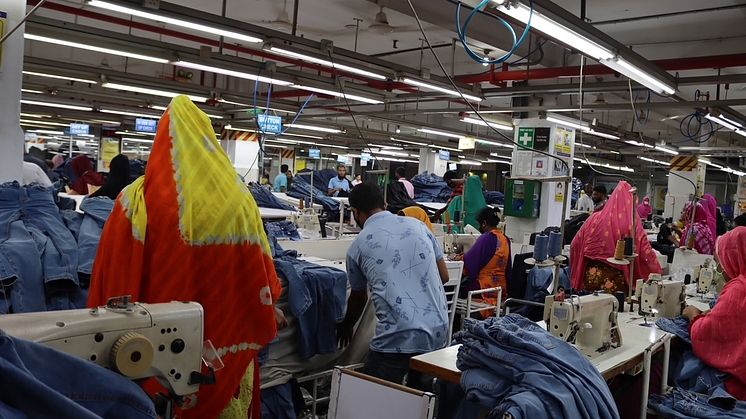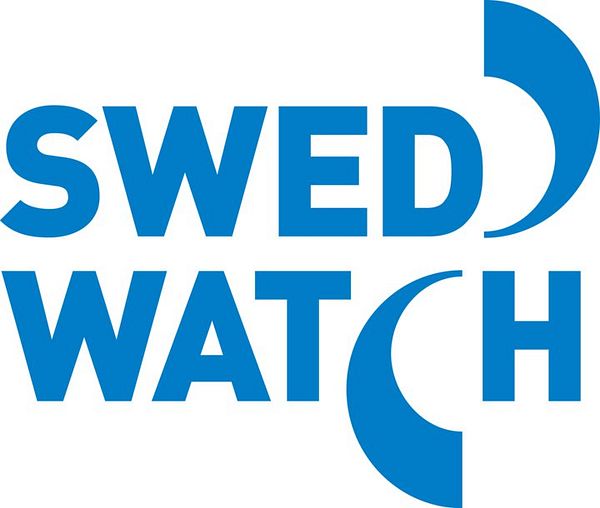
Pressmeddelande -
Swedwatch: Urgent action needed to secure living wages in Bangladesh’s garment sector
A new report from Swedwatch highlights ongoing wage violations in Bangladesh’s garment sector, with workers depending on overtime pay to make ends meet, often falling into chronic debt. The EU's new corporate sustainability due diligence directive carries the potential to curb this trend, yet further actions are needed.
Garment workers in Bangladesh remain trapped in an exploitative system that deprives them of the ability to meet their basic needs. Decades of activism and corporate pledges have yet to secure a so-called living wage – a fundamental human right – for these workers.
-With global brands sourcing garments from Bangladesh facing stricter human rights requirements, they have no excuse but to take immediate and decisive action aimed at improving workers ‘ access to living wages, says Sofia Käll, programme officer at Swedwatch, who conducted research in Bangladesh in May 2023.
The new report from Swedwatch highlights the devastating consequences of low wages, revealing how the lack of bargaining power, exacerbated by pressure from global buyers, leaves workers heavily dependent on overtime pay and trapped in a cycle of chronic debt.
The need for a living wage
Bangladesh is a leading supplier of garments to the EU market and a top producer for many of the world’s largest clothing brands. Yet, it ranks among the ten worst countries to work in, according to the International Trade Union Confederation (ITUC) 2024 Global Rights Index. Main factors contributing to the low rating include inadequate wages and laws that severely restrict workers’ right to form trade unions.
The recent national minimum wage increase to 12,500 taka (€94) per month still leaves workers earning less than 40% of what could be considered a living wage. This wage is also significantly lower than the 23,000 taka (€198) demanded by workers, unions and international organisations, including unions affiliated with IndustriALL Global Union Bangladesh.
In accordance with the United Nations Guiding Principles on Business and Human Rights (UNGPs), global brands are expected to identify and address the risks posed by inadequate wages in their value chains. The recently adopted EU Corporate Sustainability Due Diligence Directive (CSDDD) takes it a step further by imposing binding obligations on companies to address these issues.
-The EU’s Corporate Sustainability Due Diligence Directive presents a unique opportunity for EU member states, including Sweden, home to some major clothing brands, to ensure access to decent work and living wages, says Sofia Käll.
The report underscores the systemic challenges facing Bangladesh’s garment sector and calls for strong enforcement of the CSDDD to address these deep-rooted issues. While these findings relate specifically to Bangladesh, they reflect a broader, structural problem across garment-producing countries worldwide.
Key findings and challenges
Swedwatch’s on-site research was conducted in May 2023 in the major garment production hubs of Dhaka, Ashulia, and Tongi, in collaboration with Awaj Foundation - an organisation dedicated to advocating for workers’ rights in the garment sector.
Swedwatch carried out three focus group discussions involving a total of 27 people working in factories responsible for the end-manufacturing of garments and textiles for the EU market. In addition to the focus groups discussions, Swedwatch conducted four in-depth interviews with female workers and interviewed two executive managers from factories that are producing garments for more than ten global buyers including major EU brands.
Swedwatch findings confirm that low wages, coupled with a constant pressure to maintain production rates, have led to several negative ripple effects for workers both on and off the job such as dependency of overtime, indebtedness, poor occupational health and safety and lack of access to basic services.
Shapna, a factory worker, commented how she is trapped in debt to make ends meet.
-As we have not had any overtime work for the last six months, most of us are living life on a loan. When I get my salary, I repay the first person that I took a loan from and then take a loan from someone else. This is how the cycle of borrowing continues. Taking out loans has become part of our life now.
Another worker in a garment factory explained what happens when workers demand higher salaries:
-Our employers always say that they understand that the living cost has gone up, but the buyers are not paying a higher rate for the products.
-The current national minimum wage in Bangladesh is significantly trailing behind the levels advocated by unions. Swedwatch's research found that low pay forces workers to rely on excessive overtime to overcome indebtedness and poor living conditions. Many workers struggle to access essential services like childcare, affordable housing, and healthcare, says Sofia Käll.
The managers Swedwatch met expressed concerns that, while the demand for social and environmental compliance and production costs have increased, the prices paid by buyers have either remained the same or even dropped. With intense competition among suppliers, they risk losing orders if they were to request higher prices.
-Wage levels cannot be discussed without addressing the need for more sustainable purchasing practices. Pricing below production cost, along with short-term planning, late payments, and other factors, all undermine the financial stability of suppliers and their ability to pay fair wages, says Sofia Käll at Swedwatch.
Asif, Executive Manager, said they were aware of the dire situation for the workers:
- We fully understand that the current salary for garments workers is not enough to support a family of four, even if both adults work in the factories.
He added:
-In this global supply chain, the power dynamics are multifaceted and challenging. An example of this power imbalance is that we must disclose all our financial information to the buyers before signing a new order agreement, but we never receive any such information from them.
Swedwatch’s call to action
Swedwatch calls upon EU Member States and global brands to unlock the full potential of the CSDD Directive by guaranteeing fair wages and safe working conditions.
The Directive mandates companies to conduct human rights and environmental due diligence, which explicitly recognizes the right to fair and adequate living wages as part of the human rights obligations companies must uphold.
-With the CSDDD now adopted, the focus shifts to its effective transposition into EU Member States’ legal systems. This phase presents an opportunity for regulators to ensure robust obligations for fair purchasing practices are embedded across business operations, especially in high-risk sectors like the garment industry, says Sofia Käll.
For brands sourcing from countries such as Bangladesh, this means prioritizing living wages and integrating sustainable wage structures within their value chains. Swedwatch is committed to monitoring national implementation to ensure these provisions meet rigorous standards.
-The CSDDD must go beyond compliance. It should transform the garment industry by securing living wages, improving worker engagement, and ensuring just working conditions. For brands, this is an opportunity to demonstrate their commitment to human rights and sustainable development by aligning their practices with the directive, says Sofia Käll.
Read more here:
https://swedwatch.org/themes/s...
A Q&A from the field visit in Bangladesh, May 2023:
https://swedwatch.org/publicat...
The report is attached.
FACT BOX:
Recommendations:
The report highlights several actions for global brands and EU policymakers:
- Global brands: To support fair wages, brands should adopt responsible purchasing practices, engage meaningfully with workers, trade unions and NGOs, ensure transparency in supply chains, and staying engaged to support suppliers and living wages by for example actively adopt a living wage benchmark endorsed by reputable organisations in the field.
- EU Member States: Effective implementation of the CSDDD is critical to protect workers. Member States should align enforcement with UN Guiding Principles and OECD Guidelines, and broaden the CSDDD’s scope to include both financial entities and more companies, not only the largest ones. By doing so more brands can be included. Member States should also impose clear and strict obligations concerning responsible purchasing practices, removing obstacles for workers to seek justice, establishing a well-resourced national authority for enforcement, and adopting a unified definition of "living wage" across member states.
- · The European Commission should swiftly issue guidance for CSDDD implementation, clarifying how companies can adopt responsible purchasing practices that support living wages. Additionally, the Commission should evaluate options to curb unfair purchasing practices through complementary legislation and leverage the revision of the 2014 Public Procurement Directive to promote social and environmental sustainability across global value chains.
FACT BOX: Methodology
The briefing builds on on-site research conducted by Swedwatch in Bangladesh in May 2023, with the support of the Awaj Foundation. In addition to the focus groups discussions and interviews, Swedwatch also visited residential areas where the workers live, including one previously visited in 2014.
It should be noted that the testimonial evidence gathered is not meant to represent the entire garment sector or the value chain of any specific company. Instead, the findings aim to offer additional insights into the systemic negative impacts that workers face due to the lack of a living wage, along with the broader consequences this deprivation has on their communities and environments.
FACT BOX: What is a living wage?
For this briefing, Swedwatch uses the following definition from the Global Living Wage Coalition (2024): “The remuneration received for a standard workweek by a worker in a particular place sufficient to afford a decent standard of living for the worker and her or his family. Elements of a decent standard of living include food, water, housing, education, health care, transportation, clothing, and other essential needs including provision for unexpected events”.
Ämnen
Kategorier
Swedwatch är en ideell och politiskt obunden researchorganisation. Vårt mål är att företag, investerare och stater ska ta ansvar för mänskliga rättigheter och miljö och att rättighetsinnehavare kan göra sina röster hörda.


